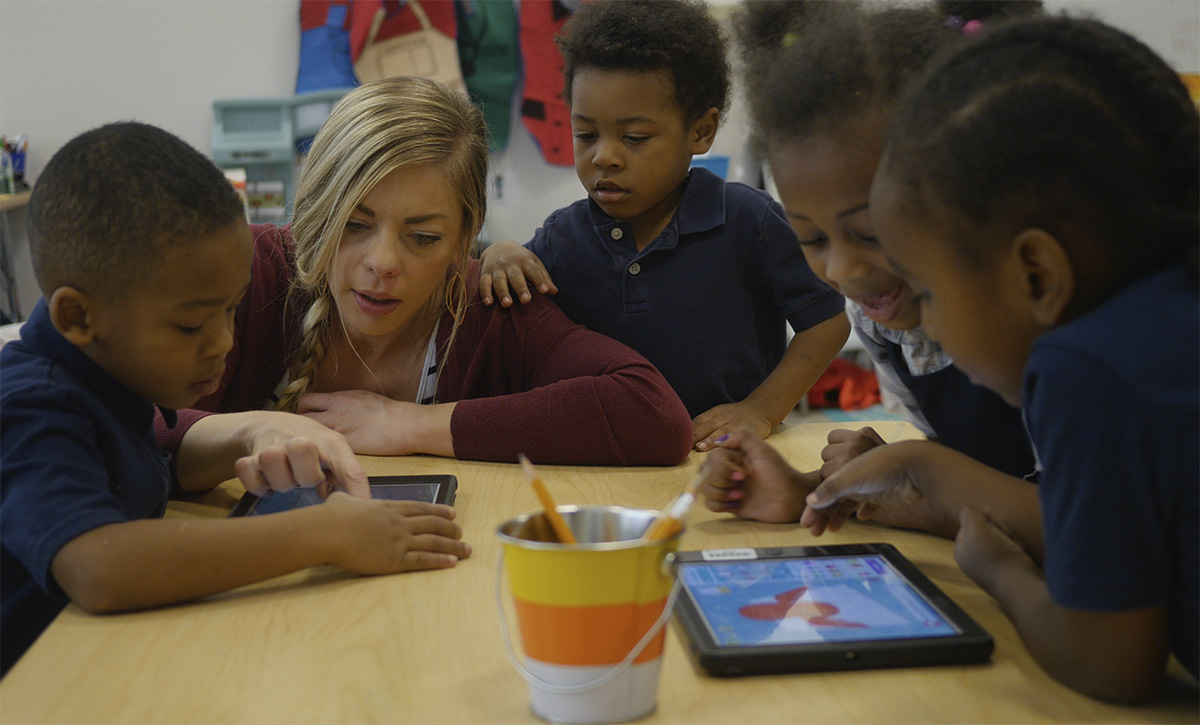Ex-Teacher’s Mission: Making Sure Ed Tech Really Works in the Classroom
Nonprofit Leanlab connects ed tech developers with schools to provide real-world testing — and a stamp of approval

Get stories like these delivered straight to your inbox. Sign up for The 74 Newsletter
Katie Boody Adorno taught middle school math for five years, both in the Kansas City Public Schools and as a founding teacher at Alta Vista Charter Middle School. It was there she realized that ed tech solutions weren’t all she had dreamed of and weren’t always ideal for her students. She wanted more say in finding — or creating — in-school tools, and she wanted students and families to be part of the process. So in 2013, she started Leanlab Education.
The Kansas City-based nonprofit connects companies and schools so innovative ed tech products can be measured and evaluated in real-life classrooms, and those insights can be reflected in the formulation of the finished piece. Leanlab awards a Codesign Product Certification to signify that participating companies partnered with a school and implemented that feedback.
“We want to give teachers and school administrators a quick way to understand if an ed tech product reflects the insights of educators, students and parents — the true end users in education — and was built for the realities of classroom environments,” Adorno says.
Four companies have been awarded the certification, and Leanlab has six more nearing the end stage of the process.
Adorno initially founded Leanlab to offer a place for people to create fresh ideas that were directly connected to teachers — what she called a “community-driven innovation lab.” But the model quickly turned toward hosting design-thinking workshops and then an incubator program that worked directly with tech companies.
“We realized we needed to get even closer to the school community voice and get those insights directly into innovation,” Adorno says. “We needed to place ed tech product into our network to improve the product directly. At the same time, we are measuring and evaluating the extent the product works for the classroom.”
Adorno says that by joining with 20 school district partners, mainly across Kansas and Missouri but now with a national reach as far as California and New York, companies can remove their own biases during testing by using an impartial classroom environment for assessment.
Brandon Burns, technology director at Clinton County R-3 School in Plattsburg, Missouri, says participating with Leanlab has multiple benefits. “Obviously, having a product at the end that better meets your needs is a huge advantage to participating in the process from early stages,” he says. “It also increases buy-in from a teacher perspective because it makes the entire use of the product immediately relevant to the user.”
The mix of schools working with Leanlab represents the “greater American population,” Adorno says, but more than 60% are Title I — and Leanlab has a particular interest in schools serving Black and Latino students. Adorno says Leanlab looks to partner with companies searching to finalize proof of concept on a viable product, but that are still open to incorporating feedback from classrooms.
So far, the nonprofit has worked with companies focused on intervention tools for core instruction subjects, such as math, or social-emotional learning. The first to earn the certification are Boddle Learning, Classcraft, Levered Learning and Sown to Grow.
“Our approach to product design has always been fueled by feedback from real-world users, but working with Leanlab allowed us to speed up the cycle,” says Mitch Slater, CEO of Levered Learning, a personalized math enrichment program. “During the pandemic, being responsive and adaptive was more critical than ever, and that mattered most to teachers and students.”
Edna Matinson, Boddle Learning CEO and co-founder, says the way Leanlab prioritizes feedback from the end users, both students and teachers, offered a high level of value for the game-based learning platform.
Leanlab wants to make research more accessible for companies while allowing schools — each with its own focus — an opportunity to test products that may fit specific needs. Backed by the Bill and Melinda Gates Foundation, the Kauffman Foundation and the Chan Zuckerberg Initiative, Leanlab offers grants to teachers and schools participating in studies.
Burns says the financial incentive to the district makes the commitment possible, but teachers also get to have a say in the early stages of product revisions. “Teachers know going in that they are going to be asked to provide feedback on understanding and usage, and being active in that process really raises the level of participation and overall understating of the product,” he says.
Triumfia Fulks, CEO and co-founder of CodeAlgo Academy, an in-class computer science program, part of the next wave of companies seeking certification, says the process has proven invaluable. “The overwhelming responses and interactions from the teachers and students are something we had not planned for,” Fulks says, “and we are greatly appreciative, as we believe their thoughts and feedback will truly impact our success.”
Adorno says another dozen companies are getting prepped for in-school testing for the fall, and Leanlab’s goal is to have 50 codesign studies by 2025. “This is a new way to develop more impactful products,” Adorno says. “That is the signal we are trying to send, that we can develop future-facing tools in partnership with schools.”
Disclosure: Walton Family Foundation and the Bill & Melinda Gates Foundation provide financial support to Leanlab and The 74.
Get stories like these delivered straight to your inbox. Sign up for The 74 Newsletter


